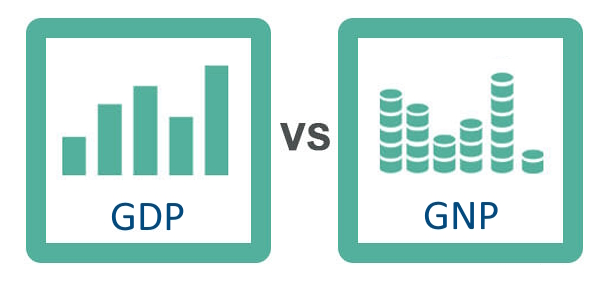Differences between Gross National Product (GNP) and Gross Domestic Product (GDP)
Gross National Product (GNP) and Gross Domestic Product (GDP) are two common measures used to assess a country’s economic performance. While they may seem similar, there are several key differences between them that make them distinct from each other. In this article, we will explore the differences between GNP and GDP in detail, including how they are measured, what factors affect them, and their limitations as economic indicators.

Table of Contents
- 1 Gross National Product (GNP) and Gross Domestic Product (GDP)
- 1.1 Definition
- 1.2 Resident vs. domestic
- 1.3 Accounting for income
- 1.4 Impact of remittances
- 1.5 Effect of foreign investment
- 1.6 Impact of multinational corporations
- 1.7 Impact of trade
- 1.8 Exchange rate effects
- 1.9 Limitations
- 1.10 Usefulness
- 1.11 Geographic Scope
- 1.12 International Trade
- 1.13 Economic Growth
- 1.14 Accuracy of Data
- 1.15 Policy Implications
- 1.16 Investment Income
- 1.17 Net Foreign Income
- 1.18 Government Spending Abroad
- 1.19 Expatriate Income
- 1.20 Nationality
- 2 Conclusion
Gross National Product (GNP) and Gross Domestic Product (GDP)
Definition
GDP and GNP are both measures of a country’s economic performance, but they differ in how they measure that performance. GDP measures the total value of goods and services produced within a country’s borders, while GNP measures the total value of goods and services produced by a country’s residents and businesses, regardless of where they are located.
Resident vs. domestic
The key difference between GDP and GNP is that GDP measures economic activity within a country’s borders, while GNP measures economic activity by a country’s residents and businesses, regardless of their location.
Accounting for income
GNP includes income earned by a country’s residents and businesses from foreign sources, while GDP does not. This means that GNP takes into account the income generated by a country’s citizens and companies working abroad, while GDP only includes income generated within the country’s borders.
Impact of remittances
Remittances, or money sent by residents working abroad back to their home country, are included in GNP but not in GDP. This is because remittances are considered part of a country’s residents’ income, which is included in GNP.
Effect of foreign investment
Foreign investment, or investment made by foreign entities in a country’s economy, is included in GDP but not in GNP. This is because foreign investment generates income within the country’s borders and is therefore included in GDP, but it is not generated by the country’s residents or businesses and is therefore not included in GNP.
Impact of multinational corporations
Multinational corporations, which operate in multiple countries, can affect both GDP and GNP. The production and income generated by a multinational corporation’s foreign operations are included in GNP, while only the production and income generated by its domestic operations are included in GDP.
Impact of trade
International trade can also affect both GDP and GNP. Exports, or goods and services produced within a country and sold to foreign countries, are included in GDP but not in GNP, as they are produced domestically. In contrast, income generated by exports is included in GNP, as it is generated by the country’s residents and businesses.
Exchange rate effects
The calculation of GNP involves converting all foreign income and production into the country’s currency. As a result, changes in exchange rates can have a significant impact on GNP, as they affect the value of foreign income and production when converted into the country’s currency.
Limitations
Both GDP and GNP have limitations as economic indicators. For example, they do not account for the distribution of wealth within a country or the impact of economic activities on the environment and social well-being.
Usefulness
Despite their limitations, GDP and GNP are both useful tools for policymakers, economists, and investors to understand the state of a country’s economy and make informed decisions. GDP is a more commonly used measure, while GNP provides insights into the income generated by a country’s residents and businesses, regardless of their location.
Geographic Scope
Another significant difference between GNP and GDP is their geographic scope. GNP includes the income generated by a country’s residents and businesses both domestically and abroad, while GDP only includes income generated within a country’s borders.
International Trade
As GNP includes income earned by a country’s residents and businesses overseas, it may be more affected by international trade than GDP. Changes in global economic conditions, such as shifts in exchange rates, can have a significant impact on a country’s GNP, but may not have as much impact on GDP.
Economic Growth
GNP may be a better measure of a country’s economic growth than GDP, especially for countries with significant overseas investments or large numbers of citizens working abroad. However, for countries that have less international trade and investment, GDP may be a more accurate indicator of economic growth.
Accuracy of Data
Due to the complexity of measuring GNP, the accuracy of GNP data may be less reliable than GDP data. GNP involves tracking income generated by a country’s residents and businesses all over the world, which can be difficult to measure accurately.
Policy Implications
The different measurements provided by GNP and GDP can have important policy implications. For example, a country with a high GDP but low GNP may want to focus on policies that encourage overseas investment, while a country with a high GNP but low GDP may need to focus on policies that promote domestic economic growth.
Investment Income
GNP includes investment income earned by a country’s residents and businesses overseas, such as dividends and interest payments, while GDP does not. This can lead to significant differences between the two measures.
Net Foreign Income
Another key difference between GNP and GDP is the inclusion of net foreign income. GNP includes net foreign income, which is the difference between income earned by a country’s residents and businesses abroad and income earned by foreign residents and businesses in the country. GDP does not include net foreign income.
Government Spending Abroad
GNP includes government spending abroad, such as foreign aid, while GDP only includes government spending within the country.
Expatriate Income
GNP includes income earned by expatriates who work abroad but still retain citizenship in their home country, while GDP does not.
Nationality
GNP measures the output of goods and services by a country’s citizens, regardless of where they are located. In contrast, GDP measures the output of goods and services within a country’s borders, regardless of the nationality of the people who produced them.”
Conclusion
While GDP and GNP may seem similar at first glance, they are distinct measures of a country’s economic performance. GDP measures the total value of goods and services produced within a country’s borders, while GNP measures the total value of goods and services produced by a country’s residents and businesses, regardless of where they are located.
The differences between these measures have important policy implications and can help policymakers, economists, and investors to better understand the state of a country’s economy. However, it is important to keep in mind the limitations of these measures, such as their failure to account for the distribution of wealth and the impact of economic activities on social and environmental well-being.


